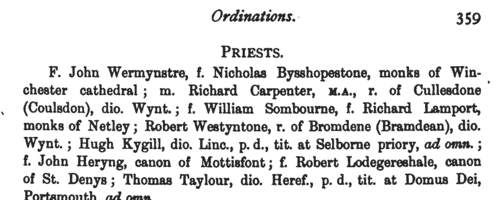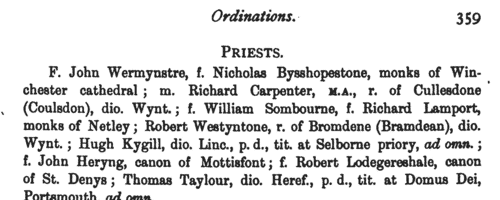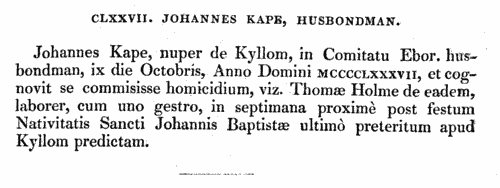Breche Surname Ancestry ResultsOur indexes 1000-1999 include entries for the spelling 'breche'. In the period you have requested, we have the following 22 records (displaying 11 to 20): Single Surname Subscription | | | Buying all 22 results of this search individually would cost £100.00. But you can have free access to all 22 records for a year, to view, to save and print, for £100. More... |
These sample scans are from the original record. You will get scans of the full pages or articles where the surname you searched for has been found. Your web browser may prevent the sample windows from opening; in this case please change your browser settings to allow pop-up windows from this site. Hampshire and Surrey clerks, clerics, monks and clergy
(1380)
Ordinations as acolytes, subdeacons, deacons and priests, from the register of bishop William de Wykeham of Winchester. Winchester diocese covered Hampshire and Surrey; the ordinations also attracted many persons from distant dioceses bearing letters dimissory from their ordinaries, and these are duly noted in the text. Many of these clerks would not go on to obtain benefices and remain celibate. The lists of subdeacons, deacons and priests state the clerks' respective titles, i. e., give the names of the person or religious house undertaking to support them. Monks and friars are indicated ('f.' = brother). The acolyte lists usually give parish of origin or title. The sample scan is from 1404.BRECHE. Cost: £6.00.  | Sample scan, click to enlarge

| Hampshire and Surrey clerks, clerics, monks and clergy
(1381)
Ordinations as acolytes, subdeacons, deacons and priests, from the register of bishop William de Wykeham of Winchester. Winchester diocese covered Hampshire and Surrey; the ordinations also attracted many persons from distant dioceses bearing letters dimissory from their ordinaries, and these are duly noted in the text. Many of these clerks would not go on to obtain benefices and remain celibate. The lists of subdeacons, deacons and priests state the clerks' respective titles, i. e., give the names of the person or religious house undertaking to support them. Monks and friars are indicated ('f.' = brother). The acolyte lists usually give parish of origin or title. The sample scan is from 1404.BRECHE. Cost: £6.00.  | Sample scan, click to enlarge

| Fine Rolls
(1377-1383)
The fine rolls of the 1st to 6th years of the reign of king Richard II record part of the government administration in England, with orders sent out day by day to individual officers, and commitment of particular responsibilities and duties. There is also some material relating to Wales, Scotland, Ireland and the English possessions in France. BRECHE. Cost: £4.00.  | Sample scan, click to enlarge

| Clergy, the religious and the faithful in Britain and Ireland
(1362-1404)
These are abstracts of the entries relating to Great Britain and Ireland from the Regesta of popes Urban V, Gregory XI, (Anti-Pope) Clement VII, Urban VI and Boniface IX, and the Lateran Regesta of Boniface IX. Many of these entries relate to clerical appointments and disputes, but there are also indults to devout laymen and women for portable altars, remission of sins, &c. This source is particularly valuable for Ireland, for which many of the key government records of this period are lost. Urban V was consecrated and crowned 6 November 1362 (the day from which his pontificate is dated); Gregory XI was crowned 5 January 1371; Clement VII 31 October 1378; Urban VI 18 April 1378; Boniface IX 9 November 1389 and died 1 October 1404. Until 1376 the papacy was in exile at Avignon. The extracts were made by W. H. Bliss from Regesta ccxlv to cccxx and Lateran Regesta i to xliii, and published in 1902. Bliss remarked that 'although the writing of the Papal Registers of the 14th century is clearer than that of many contemporary English MSS., the entries in them were for the most part founded upon petitions or letters from different countries, and the scribes in the Papal Chancery must have experienced even greater difficulty in copying English proper names than English students experience nowadays in reading the early Chancery Rolls preserved in the Public Record Office. Not having local or personal knowledge, they constantly misread doubtful letters.'BRECHE. Cost: £4.00.  | Sample scan, click to enlarge

| Grantees of offices, commissions and pardons
(1413-1416)
The Patent Rolls are the Chancery enrolments of royal letters patent. Those for the 1st, 2nd and 3rd years of the reign of king Henry V (21 March 1413 to 20 March 1416) were edited for the Public Record Office by R. C. Fowler, and published in 1910. The main contents are royal commissions and grants; ratifications of ecclesiastical estates; writs of aid to royal servants and purveyors; and pardons. The commissions of the peace issued for the English towns and counties and entered on the rolls, being largely repetitive, have been consolidated in a single appendix.BRECHE. Cost: £2.00.  | Sample scan, click to enlarge

| Early records of Wells cathedral, in Somerset
(1001-1500)
Three early registers of the dean and chapter of Wells - the Liber Albus I (White Book; R I), Liber Albus II (R III), and Liber Ruber (Red Book; R II, section i) - were edited by W. H. B. Bird for the Historical Manuscripts Commissioners and published in 1907. These three books comprise, with some repetition, a cartulary of possessions of the cathedral, with grants of land dating back as early as the 8th century, well before the development of hereditary surnames in England; acts of the dean and chapter; and surveys of their estates, mostly in Somerset.BRECHE. Cost: £6.00.  | Sample scan, click to enlarge

| Taxpayers in Sussex
(1524-1525)
By Act of Parliament of 1523 (14 & 15 Hen. III, c. 16) a general subsidy was raised, spread over four years, from laymen, clergy and peers. In each of the first two years 1s in the £ was raised from annual income from land; 1s in the £ on capital goods worth over £2 and under £20; and a flat payment of 4d on goods worth from £1 to £2, and also by persons aged 16 and upwards in receipt of £1 per annum in wages. In the third year a further shilling in the pound was payable on land worth £50 and upwards a year; and in the fourth year a shilling in the pound on goods worth £50 and upwards. To raise this revenue, returns were required from every hundred, parish or township. In Sussex, the returns for 1524 and 1525 cover the city of Chichester (divided into Estrata, Westrata, Southstrata, North[strata] and Palenta), the borough of Midhurst, and then the rest of the county divided into rapes, within those into hundreds, and within those into boroughs, tithings, liberties, townships or parishes. It is important to note that the cinque ports of Hastings, Rye and Winchelsea were exempt from the subsidy, except for alien inhabitants; and that the town of Westbourne was also exempted 'as the town was lately destroyed by fire'. Aliens are noted as such, sometimes with nationality; and Brighthelmstone (Brighton), which had been burnt by the French in 1514, is only represented fragmentarily. The Sussex Record Society published this transcript and edition by Julian Cornwall of the 1524 and 1525 returns: the 1524 return was used for the main transcript where possible, names peculiar to the 1524 lists being marked with an asterisk, and those with amendments in 1524 with a dagger. At the foot of each 1524 return the new names from 1525 are given. Only the amount of the assessment is printed (m. = marks). Letters prefixed to the sum give the basis of the assessment, no letter (or G) meaning that it was on goods - A, annual wages; D, annual wages of day-labourers; F, fees or salaries of office; L, lands; P, profits; W, wages; x, no basis stated. BRECHE. Cost: £4.00.  | Sample scan, click to enlarge

| Murderers sheltering in Beverley Minster: and their victims
(1478-1539)
Criminals could evade pursuit by claiming sanctuary in the church of St John in Beverley, in the East Riding of Yorkshire. This liberty of the minster extended a league in every direction from the church door, and was divided into six sections, each giving greater sanctity to the rights of sanctuary, the sixth and innermost section being the presbitery or chancel. Near the altar there was a stone chair called the Frith Stool, seated on which an accused could claim total immunity. The bailiff would receive the oath of the fugitive, and a clerk recorded 'what man he killed, and wher with, and both ther namez'; the bailiff receiving a fee of 2s 4d, the clerk 4d. Sanctuary was afforded for 30 days, with food and lodging, after which the fugitive was protected to the borders of the county. But within 40 days he had to appear before the coroner, clothed in sackcloth, and be branded on his right hand with the sign of the letter A. This signified that he was swearing to abjure the realm: he was then free to leave the country unhindered. At Beverley the clerks kept a separate register of fugitives' petitions, which survives from 1478 to 1539 in Harleian Manuscript 560. It was edited and printed by the Surtees Society in 1837 under the title Sanctuarium Beverlacense. Some of the criminals came from a considerable distance: the great majority were murderers or homicides. Each entry usually gives full name, original address, (often) trade, a brief description of the crime, often with date, and usually the name of the victim. This index covers all the surnames given.BRECHE. Cost: £4.00.  | Sample scan, click to enlarge

| Liegemen and Traitors, Pirates and Spies
(1547-1550)
The Privy Council of Edward VI was responsible for internal security in England and Wales, and dealt with all manner of special and urgent matters
BRECHE. Cost: £4.00.  | Sample scan, click to enlarge

| Penshurst Manuscripts
(1150-1580)
C. L. Kingsford prepared a calendar of the papers of Lord de L'Isle and Dudley at Penshurst Place in Kent for the Historical Manuscripts Commission, of which this first volume was published in 1925. The material is presented in eleven sections: I. 39 deeds relating to the Sydney family's Surrey and Sussex estates from about 1150 to 1502; II. Summary notes on deeds from these and other English counties (mainly Essex, Kent, Lincolnshire and Yorkshire) and from Wales and Ireland; III. Documents relating to Robertsbridge Abbey in Sussex (charters and deeds; rentals; court rolls; reeve's accounts at Footland; and bursar's accounts) from 1160 onwards; IV. Deeds and documents relating to the church and college of Tattershall in Lincolnshire (deeds; statutes and ordinances; miscellaneous papers; court rolls; and accounts (warden's, steward's, precentor's and impositor's, receiver's, bailiffs', and building and post-dissolution accounts); V. Family papers and estates accounts of the Cromwells of Tattershall (general accounts and wills; accounts of stewards of the household; building accounts of Tattershall castle; estate accounts); VI. Summary lists of various rolls, rentals, surveys and accounts, from various counties (mainly Kent and Lincolnshire); VII. Documents relating to Penshurst and its owners; VIII. Sydney family papers; IX. Accounts of the ironworks at Robertsbridge and in Glamorgan; X. Papers relating to the Council of Wales, 1526 to 1580; and XI. Irish Accounts, from sir Henry Sydney's terms as Vice-Treasurer and Lord Deputy of Ireland, 1556 to 1578.BRECHE. Cost: £4.00.  | Sample scan, click to enlarge

|
Research your ancestry, family history, genealogy and one-name study by direct access to original records and archives indexed by surname.
|












